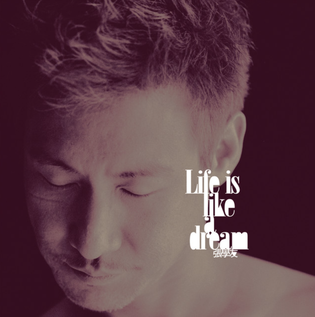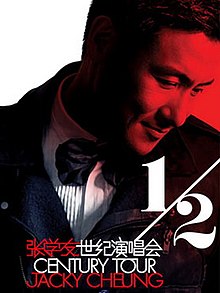Cantopop is a genre of pop music sung in Cantonese. Cantopop is also used to refer to the cultural context of its production and consumption. The genre began in the 1970s and became associated with Hong Kong popular music from the middle of the decade. Cantopop then reached its height of popularity in the 1980s and 1990s before slowly declining in the 2000s and shrinking in the 2010s. The term "Cantopop" itself was coined in 1978 after "Cantorock", a term first used in 1974. In the 1980s, Cantopop reached its highest glory with fanbase and concerts all over the world, especially in Macau, Mainland China, Taiwan, Singapore, Malaysia, South Korea, and Japan. This was even more obvious with the influx of songs from Hong Kong movies during the time.

Jacky Cheung Hok-yau is a Hong Kong singer and actor. Cheung is widely regarded as a Heavenly King of Cantopop music and an icon of Hong Kong popular culture. He is often dubbed as the "God of Songs" for his vocal delivery and live performances.

Daniel Lindström is a Swedish singer from Umeå who won the Swedish Idol 2004 contest against Darin Zanyar. His first single, "Coming True", sold double platinum, and his self-titled album, released in December 2004, topped the Swedish pop charts. The second album Nån slags verklighet contains songs written in Swedish by the singer himself. His third album, D-Day, was released in January 2009. For a time, he lived with his wife and child in Solna, Sweden.
Snow.Wolf.Lake is Hong Kong's first modern musical. Jacky Cheung, a cantopop artist, was the artistic director of the show and also played character Wolf in the musical. The running time of the musical is about three hours. It has two versions: Cantonese and Mandarin. The title combines the Chinese name of the two main characters, "Wolf", the male protagonist, and "Snow", the female protagonist. "Lake" refers to a plot related element.

Roxanne Joy Seeman is an American songwriter and lyricist. She is best known for her songs by Billie Hughes, Philip Bailey, Phil Collins, Earth, Wind & Fire, Barbra Streisand, Bette Midler, The Sisters of Mercy, The Jacksons, Jacky Cheung, and in film and television. She has two Emmy nominations.

Keith Chan Siu-kei is a Chinese pop song lyricist and record producer from Hong Kong. Since 1984, he has written over 3,000 Cantonese and Mandarin songs and won numerous awards from various Internet media in Hong Kong and Mainland China, including Best Chinese Lyrics Awards and Best Chinese Song Awards. His work can be found in albums released by many Hong Kong singers, including Jacky Cheung, Hacken Lee, Andy Lau, Aaron Kwok, and Gigi Leung.

Daniel Nitt is a German recording artist, songwriter, music producer, and composer. Daniel Nitt was born in Pegnitz, Germany and currently resides in Berlin, Germany.

Double Trouble is a song by Hong Kong singer and actor Jacky Cheung, written by Roxanne Seeman, Kine Ludvigsen-Fossheim, and Olav Fossheim with lyrics adapted into Cantonese by Hong Kong lyricist Kenny So. Double Trouble was issued as the first single from Cheung's Private Corner album, released by What's Music, a subsidiary label of Universal Music Group in 2010, with a companion MV premiering March 2010.
"Everyday Is Christmas" is a Christmas song by Jacky Cheung, written by Roxanne Seeman and Philipp Steinke. It was issued as a single from Cheung's Private Corner album released on January 29, 2010, by Universal Music. The song was ranked by Nokia's Ovi.com download service as the tenth most downloaded Christmas song in 2010.
"Lucky in Love" is a song by Hong Kong singer and actor Jacky Cheung. It is the theme song of the 2010 Hong Kong film Crossing Hennessy. The song was written by Roxanne Seeman and Daniel Nitt with Cantonese lyrics by Kenny So. It was produced by Andrew Tuason (杜自持) in Hong Kong and released on Cheung's Private Corner album on January 29, 2010.
"Let It Go" is a song by Hong Kong singer and actor Jacky Cheung written by Roxanne Seeman, Daniel Lindstrom and Daniele Musto for Cheung's album Private Corner (2010). Cantonese lyrics were written by Kenny So. The song was released to radio by Universal Music in April 2010 as the fourth single and is the seventh track on the album.

No One Knows is an extended play (EP) by Hong Kong actress and singer Stephy Tang, released on July 16, 2010 by Gold Typhoon. The title song was released as the first single and MV; it is the first of four tracks and was written by Roxanne Seeman, Kine Ludvigsen-Fossheim, and Olav Fossheim, with Cantonese lyrics by Yan Kin Keung. Tang sings all four tracks in Cantonese.
"Which Way, Robert Frost" is a song by Jacky Cheung, written by Roxanne Seeman and Philipp Steinke for Cheung's Private Corner album. The title and lyrics refer to the narrative poem "The Road Not Taken" written by the American poet Robert Frost. The lyrics were adapted into Cantonese by Kenny So. It was released on January 29, 2010, by Universal Music.

Andrew Tuason is a Hong Kong musician, record producer, composer, songwriter, arranger, conductor and musical director. He has been a producer and musical director for notable artists including Jacky Cheung, Andy Lau, Jackie Chan, Alan Tam and Coco Lee.

Life Is Like a Dream is an album by Hong Kong singer Jacky Cheung, released on April 20, 2004. It was produced by Cheung and Michael Au. Two versions were produced: a Hong Kong version and a Mainland version.

The Jacky Cheung 1/2 Century World Tour was a concert tour by Hong Kong singer and actor Jacky Cheung, one of the "Four Heavenly Kings" also known as "God of Songs", named in honor of his 50th birthday, marking a half-century of life in song and dance. The tour opened on 30 December 2010 at the Mercedes-Benz Arena, Shanghai and concluded on 20 May 2012 at the Hong Kong Coliseum, Hong Kong, consisting of 146 shows performed in 77 cities. The total audience was more than 2.8 million attendees with the number of people wanting to see the show exceeding the limited number of tickets.
Kenny So, is a Chinese lyricist and poet best known for his songs by Nicholas Tse, Sandy Lam, and Jacky Cheung. His movie theme songs received nominations at the 33rd Hong Kong Film Awards in 2014, and the 40th Hong Kong Film Awards in 2022. His entry 一個人的浪漫 was selected as 網上最受歡迎歌曲 in the 18th CASH Pop Composition Competition, and his entry Pink Eye Syndrome won the third place in the 19th CASH Pop Composition Competition.

The discography of Hong Kong recording artist Jacky Cheung consists of 37 studio albums, including 22 in Cantonese and 15 in Mandarin. His fifth Mandarin studio album, The Goodbye Kiss, recorded sales of over 4,000,000 copies in China, 1,360,000 copies in Taiwan, 500,000 copies in Malaysia, and over 200,000 copies in Singapore, making it amongst the best-selling albums of all time in each country. Cheung has reportedly sold between 25 million to 60 million albums throughout his career.

A Classic Tour was a concert tour by Hong Kong recording artist Jacky Cheung. The tour began on October 21, 2016, at the LeTV Sports Ecological Center in Beijing, China. It concluded on January 29, 2019, at the Hong Kong Coliseum in Hong Kong.












